Focus On The Future

Stefan Lazarević
Brooke Isham USAID Serbia Mission Director
Aleksandar Vratonjić Gligorijević CMO, TeleGroup





Stefan Lazarević
Brooke Isham USAID Serbia Mission Director
Aleksandar Vratonjić Gligorijević CMO, TeleGroup



EDITOR IN CHIEF
Neda Lukić n.lukic@aim.rs
ART DIRECTOR
Branislav Ninković b.ninkovic@aim.rs
PHOTOS Zoran Petrović
COPY EDITOR Mark Pullen mrpeditorial@mail.com
Serbia
Vera Nikolić Dimić AmCham Executive Director
Nenad Đurđević
Commercial Director for SEE, Turkey and CIS at Ball Packaging
PROJECT MANAGERS
Biljana Dević
b.devic@aim.rs
Mihailo Čučković
m.cuckovic@aim.rs
Renata Šteković Zagorac r.zagorac@aim.rs
OFFICE MANAGER
Svetlana Petrović s.petrovic@aim.rs

FINANCE
Dragana Skrobonja finance@aim.rs


Aleksandar Selakov Ph.D. Gray Cell CEO; Professor at the University of Novi Sad Faculty of Technical Sciences
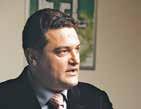
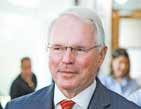
EXECUTIVE DIRECTOR
Maja Vidaković m.vidakovic@aim.rs
DIRECTOR
Ana Novčić a.novcic@aim.rs a.novcic@cordmagazine.com
PUBLISHER
Ivan Novčić i.novcic@aim.rs

PRINTING
Rotografika d.o.o.
Segedinski put 72, Subotica
USA 2023
Published by:
alliance international media
Prote Mateje 52, 11111 Belgrade 17, PAK 126909, Serbia
Phone: +(381 11) 2450 508
E-mail: office@aim.rs; office@cordmagazine.com
www.aim.rs; www.cordmagazine.com
ISSN: 2560-4465
All rights reserved
alliance international media 2023
The views expressed in this publication are those of the presenter; they do not necessary reflect the view of publications published by alliance international media
THIS PUBLICATION IS FREE OF CHARGE



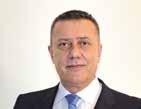






The Serbian-American bilateral relationship has undergone a significant transformation since the challenging times of the 1990s. The progress we have witnessed is noteworthy, highlighting the positive state of our country’s partnership with the United States
Commemorative issue of postage stamps “140th Anniversary of SerbianAmerican Diplomatic Relations”

ment. Moreover, bilateral trade agreements and initiatives have facilitated greater market access, opening up new avenues to economic cooperation and expansion.
The sectors where interest in further collaboration is on the rise includes technology, innovation, energy, agriculture, and infrastructure development. Joint ventures, research partnerships, and knowledge-sharing initiatives have the potential to unlock mutually beneficial opportunities and create a positive ripple effect across various industries.
One of the most encouraging aspects of the evolving relationship between Serbia and the U.S. is the increasing investment in Serbia by American companies. This growing trend not only demonstrates confidence in Serbia’s economic potential, but also results in mutually beneficial opportunities for both nations. This collaboration symbolizes a departure from the adversarial dynamics of the past and emphasizes a partnership approach in addressing growing economic opportunities.
Building upon the previous comment, it is crucial to reflect on the economic prospects that have recently emerged in the Serbian-American bilateral relationship. Increasing investment in Serbia by American firms stands as a testament to the confidence and trust placed in Serbia’s economic potential. These investments have not only injected vital capital into the na-
tional economy, but rather have also paved the way to job creation, technological advancements, and transfers of knowledge. The collaborative efforts between Serbian
Even in the economic sector, some political contextualization is inevitable. The U.S. supports Serbia in achieving energy independence from Russian sources, and thus seeks to foster new partnerships with American and European firms in the green economy sector. The keen inter-
and American businesses have fostered a dynamic and innovative entrepreneurial environment, contributing to the sustained growth and prosperity of both nations.
Serbia’s strategic geographic location, skilled workforce, and favorable business climate are key factors attracting American companies. The Serbian government’s commitment to implementing business-friendly policies and economic reforms has resulted in an environment more conducive to foreign direct invest-
est expressed by recent trade delegations demonstrates the desire of U.S. companies to be part of Serbia’s journey towards energy independence.
Overall, the increasing economic ties between Serbia and the U.S. underscore the evolving dynamics of the partnership between our two countries. The positive trajectory of the Serbian-American bilateral relationship serves as a testament to the progress achieved and sets the stage for even greater accomplishments in the future.
While there is always room for improvement, it is evident that the partnership between Serbia and the U.S. is strong and growing even strongerAuthor: Jakša Vlahović, creator of the stamps of Post of Serbia

Our relationships with the government of Serbia are open and constructive as we tackle tough global problems together as partners, rather than adversaries. Just last month, you even saw the President of the United States congratulating Serbia’s great basketball player on leading his team to the NBA Championship. No one would have foreseen that in the 1990s ~ Christopher Hill

As someone who is very well acquainted with Serbia from the crisis years of the 1990s, Christopher Hill, current U.S. ambassador to Serbia, agrees with the assessment that relations between his country and Serbia have improved significantly since those dark days. Speaking in this interview for CorD Magazine, he notes that proof of this fact is provided by U.S. support to Serbia on its path to EU membership, but also military and economic cooperation. In this context, Ambassador Hill also confirms his country’s interest in being part of Serbia’s energy transformation, which business delegations from the U.S. have discussed with their interlocutors in Belgrade.
Your Excellency, you have now entered your second year as ambassador to Serbia. Do you consider that the U.S. has managed to make positive advances in terms of the quality of relations with partners in Belgrade compared to the end of the ‘90s, which is the period for which you are recognizable?
— The quality of our partnerships has advanced dramatically since the 1990s, no question. American firms are investing in Serbia at a rapidly growing pace. Our armed forces work closely together to maintain peace and security throughout the region, and increasingly around the world. Our relationships with the government of Serbia are open and constructive as we tackle tough global problems together as partners, rather than adversaries. Just last month, you even saw the President of the United States congratulating Serbia’s great basketball player on leading his team to the NBA Championship. No one would have foreseen that in the 1990s. We can always improve, but the partnership we’ve built with Serbia is strong and getting stronger, and it delivers benefits to Serbian and American people every day.
When Serbian leaders state today that the U.S. now has a better understanding of Serbia, what does that actually mean?
— I’m not going to speak for Serbia’s leaders, but I can say that it’s been my experience that our mutual understanding is growing all the time, thanks in large part to those partnerships I just mentioned. And as that understanding grows, we all see that Serbs and Americans are more alike than we are different. I like to talk about how Serbia has chosen a future in the West, but the reverse is also true: the West has chosen Serbia as a partner, because Americans and Europeans look at Serbia and see a country with an immense reservoir of talent. We see people who want to do business the same way we do, who want to join with us to solve complex
The partnership we’ve built with Serbia is strong and getting stronger, and it delivers benefits to Serbian and American people every day
Serbia still has its challenges, but that shouldn’t blind us to the progress that has been made. And that progress should give us hope
With access to a wealth of natural resources, Serbia is poised to become a leader in Europe’s 21st century green economy
By Ljubica Gojgićproblems and make the world better for our children and grandchildren. I think we understand one another very well. We’re constantly learning from one another and challenging one another, as friends should. It’s important to keep that process going.
With regard to recent events in Kosovo, many were surprised by the severity with which Washington responded to the Kosovo Prime Minister and the government in Pristina. Some media reports even used the wording “America imposes sanctions on Kosovo”. What is this really all about: a warning; the revoking of cooperation with Albin Kurti alone, or the expressing of Washington’s readiness to, say, withdraw support for Kosovo’s membership in the Council of Europe?
— I’ll let my colleague in Pristina, Ambassador Hovenier, speak about our relationship with Kosovo. I will say that I was shocked on my arrival here to see that the problem of Kosovo’s status still sucks up so much time and attention that could be better directed towards Serbia’s development and the realization of its European aspirations. We want to resolve these issues once and for all so that Serbia can get on with the business of taking its rightful place in the European Union and as a part of the larger political, economic, and security structures of the Euro-Atlantic community.
Belgrade and Pristina are being called on to return to dialogue and the implementing of commitments agreed to in Brussels and Ohrid. However, a major discrepancy exists when it comes to the interpretation of what has been agreed. In his recent guest appearance on CNN, Serbian President Vučić said that recognizing Kosovo’s independence is not the issue, but rather normalizing relations. How would you define the normalization of relations in this context?
— I’d point you to the agreement. It means establishing an Association of Serb-majority Municipalities so that the Serb community in Kosovo has a sense of security regarding the future. It means both countries recognizing one another’s documents and national symbols, including license plates, identity cards, diplomas. It means ensuring the free movement for people and goods, so the economy of the entire region can thrive. And it means not standing in the way of one another’s integration into regional and international bodies. It means showing the European Union that Serbia is ready for membership and won’t bring the problems of the past with it. It means taking the steps necessary to allow normal life to function for all citizens of the region, and ultimately unlocking the region’s vast economic potential.
James O’Brien is another expert who’s very familiar with the Balkans from the time of President Bill Clinton. What does his appointment as Assistant Secretary of State for European and Eurasian Affairs mean for relations between the U.S. and Serbia?
— Jim O’Brien is a longtime colleague and a good friend. He’s someone with deep knowledge of this region and immense respect for its culture, its his-

its highest ever level, especially in the IT sector. Great interest in cooperation in the domain of energy has also been noticeable since your arrival in Serbia. You have even discussed a possible strategic partnership with your interlocutors from the government. Does that imply more tangible arrangements related to company Electric Power of Serbia?
tory, and the people who live here. I know he’s someone who wants to see Serbia thrive and realize its full potential. So, I think his nomination is great news for Serbia, and I look forward to working with him closely once he’s confirmed.
According to Serbian government statistics, economic cooperation with the U.S. has reached
— We are 100% committed to helping Serbia gain its independence from Russian energy, so we are always looking for opportunities to encourage new partnerships with American and European firms. The opportunities in Serbia right now are incredible. With access to a wealth of natural resources, Serbia is poised to become a leader in Europe’s 21st century green economy, and the clean energy sector plays a big part in that. America is eager to be a part of that transformation, which is evident in the interest we’ve seen in the recent trade delegations that have visited. We’re open to all possibilities. As for EPS, I think Serbia’s partnership with Norway promises great benefits, and we’ve been glad to see that develop.
Your recent assessment that there “should be no question as to whether Serbia is moving towards the European Union and growing into a responsible democracy where the rights of jour-
Serbia has chosen a future in the West, but the reverse is also true: the West has chosen Serbia as a partner, because Americans and Europeans look at Serbia and see a country with an immense reservoir of talent
nalists are respected” was seen by part of the public as being too generous towards the authorities. It is also in stark contrast, for example, to the way Serbia is viewed by Washington, D.C.-based Freedom House, which classifies Serbia as an endangered democracy with a “hybrid regime”. Who has the better perspective, you or them?
— As I believe I said on that same occasion, with respect to these issues, I often come back to the words of Martin Luther King, Jr., who famously said, “The arc of the moral universe is long, but it bends towards justice.” There is wisdom in that perspective. Your first question asked about how our partnerships have changed since the 1990s, and I noted that, compared to then, the Serbia of today, and especially the Serbian-American relationship, is almost unrecognizable. Serbia still has its challenges, but that shouldn’t blind us to the progress that has been made. And that progress should give us hope. As an ambassador, I’m not here to sit in judgment of Serbia. I’m here to build a relationship that will help propel Serbia forward, because when Serbia does well, both our countries benefit. That’s where my focus is every day.

As an ambassador, I’m not here to sit in judgment of Serbia. I’m here to build a relationship that will help propel Serbia forward, because when Serbia does well, both our countries benefit. That’s where my focus is every day

I was shocked on my arrival here to see that the problem of Kosovo’s status still sucks up so much time and attention that could be better directed towards Serbia’s development and the realization of its EU aspirations
The visit of more than 40 representatives of major U.S. companies sends a clear signal that the current U.S. administration gives a strong impetus to developing economic cooperation with Serbia. And strengthening strategic partnerships like the one with the U.S. is crucial to the development of our economic potential ~ Stefan Lazarević

We recently had an opportunity to see two important delegations of American companies visit Serbia, bringing more than 40 representatives of major U.S. companies to Serbia in a period of just four months. This is excellent news for us, says AmCham Serbia President Stefan Lazarević.
When it comes to discussing potential, an emphasis is ordinarily placed on investments and the creation of new jobs, but our interlocutor explains that it should also be noted that Serbia generated record revenues exceeding 1.2 billion dollars from the export of services to the United States in 2022, which represents an increase of a whopping 30 percent compared to 2021. “It is thus clear that strengthening strategic partnerships like the one with the U.S. is crucial to the development of our economic potential. I believe that, apart from well-known geopolitical reasons, one more important reason for American business’s fresh interest in our country is the region’s internal connectivity through the Open Balkan initiative, the implementation of which Serbia is working on intensively.”
You mention the Open Balkan initiative. How attractive is this concept operationally, from the point of view of investors, and in the context of creating this unique economic space what more should be done for it to receive its full synergistic effects?
— We should be conscious of the size of our economy and that of the region as a whole – these are small markets, and connecting them through the opening of borders represents an incalculable advantage for investment and business. The Initiative’s most important advantage is that it makes the market of the Western Balkans more attractive for doing business, because I’m convinced that with its full implementation we will ensure the free flow of people, goods, services and capital. We need to understand that companies wanting to do business in Serbia are most commonly considering the potential of developing a broader regional presence.
The Open Balkan Initiative has to date achieved serious progress in terms of resolving long-standing nontariff barriers and obstacles, which has facilitated imports and exports of food products, in some cases by as much as 50 percent, while direct costs from taxes and fees have been reduced by up to 80 percent. This has all resulted in the volume of the trade exchange in the Open Balkan region increasing by almost 30 percent. The economy strongly supports the full implementation of the Agreement on Free Access to the Labor Market, which has already been
signed and would enable the hiring of personnel who are in short supply through eased administrative procedures. Significant progress is also required in the areas of cross-border capital flows and reducing transaction costs, as well as in the liberalization of financial services.
How heavily engaged is AmCham as a chamber when it comes to supporting these efforts to ensure potential investors receive relevant information about Serbia as an investment destination?
Significant strides towards operationalizing the Open Balkan idea are also required in the areas of cross-border capital flows and reducing transaction costs, as well as in the liberalization of financial services
We are awaited by the development and growth of many “tech” domains, which will certainly be reflected in the level of investments in our country
AmCham members want to see progress in the area of a more transparent and efficient public procurement system and investments in education and the environment
— The American Chamber of Commerce has, for two decades already, been among the most important ports of call for American companies considering Serbia as a destination. We are committed to our mission of being a pillar of support to the business of our members through the providing of crucial business information, networking and the establishing of mutual connections, all of which are of great importance to potential investors. As one part of these efforts, AmCham’s business mission to Washington, D.C. during June included the holding of a series of very important meetings with representatives of relevant American institutions, organizations and companies, through the “Door Knock” format. I would single out the high-level meetings at the State Department, meetings with several
congressmen and senior representatives of the Department of Commerce. We additionally held a roundtable with representatives of companies interested in coming to Serbia, as well as a series of bilateral meetings. The aim of our mission was to strengthen the institutional and economic preconditions needed to increase bilateral trade and opportunities for new investments between Serbia and the U.S., as well as to present the positive experiences of American companies already doing business in our market.
AmCham has been conducting surveys on the business environment and labor prospects in Serbia for the past 10 years. As we await the results of the latest, 11th survey, could you tell us what the previous ones showed?
Connecting the countries of the Western Balkans through the opening of borders represents an incalculable advantage for investment and business
— In the opinion of AmCham members, according to the previous survey, the most important factor for improving the business environment is represented by institutional reforms – improving the work of the judiciary and the rule of law, as well as reducing corruption. The third priority is the further development of eGovernment, with its development to date being assessed favorably, as well as the continuation of efforts intended to improve the efficiency of administra-
tion. Moreover, compared to previous surveys, a more transparent and efficient public procurement system stands out as a something of a higher priority. When it comes to investments from the national budget that are essential to long-term growth, AmCham members prioritize investments in education, as they also did in previous years. Compared to previous surveys, the essential need to invest in the environment was especially highlighted.
There has really been a lot of discussion recently regarding whether the IT sector is actually experiencing a decline after rising sharply. From the point of view of your members and the inquiries you receive regarding Serbia’s IT sector, how would you rate the attractiveness of this sector for further investment?
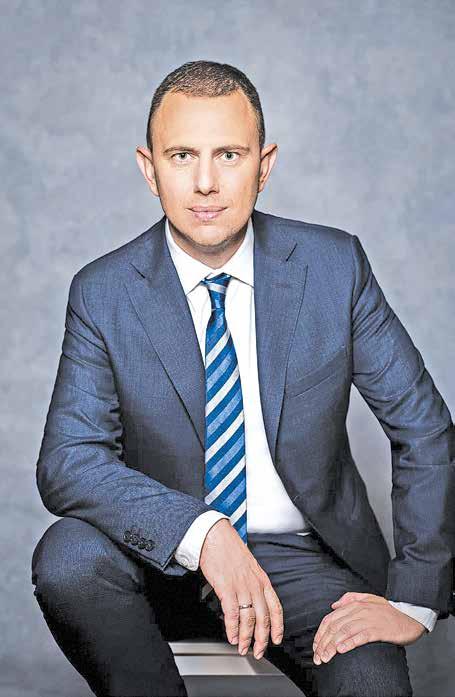
— According to estimates, over 190,000 people worldwide lost their jobs in the IT sector during the first five months of this year, which is significantly higher than across the whole of 2022. It was clear that the sudden growth of this industry, which primarily came as a result of the Covid-19 pandemic and the meteoric rise of e-commerce, would not be sustainable in the long run. On the flip side, it would be glib and superficial to talk about the “collapse of the IT industry”, rather it is more realistic
to talk about its consolidation. All estimates suggest that, over the long term, we are awaited by the development and growth of many “tech” domains, which will certainly be reflected in the level of investments in our country. Some recent inquiries that we’ve received, as well as conversations during the “Door Knock” mission to the States, provide signals in that direction, though it is too early to mention specific names. I will also add that I’m convinced Serbia should work on the creation of an ecosystem that would help us become a regional hub of research and development for innovative technologies, such as artificial intelligence and biotech, which would create opportunities to even more strongly attract new investments and for the modernization of the society and the state.
The ICT industry, biotech, energy, infrastructure, the automobile industry, agriculture and food production are attractive sectors for investment

Serbia has several important factors that make it an attractive place to do business. Among them are a talented labor force, good infrastructure, a stable currency, a facilitative regulatory environment, and close proximity to regional markets, including the Western Balkans and the EU

U.S. companies have spent more than 20 years investing significantly in many sectors in Serbia – food processing, automotive, information technology, agriculture, and others. In a positive feedback loop, the continued success of many of these companies has drawn the attention of other companies.
According to Joseph Boski, First Secretary at the Embassy of the United States to Serbia, this is why American companies, European companies, and others are increasingly choosing Serbia as a place to invest. Indeed, says our interlocutor, “continued success does not happen by accident”.
Are there specific sectors or industries that you believe provide untapped potential for bilateral trade and investment?
— There are many sectors that are doing very well and will continue to grow – these include the automotive and IT industries. I am confident these sectors will build on the successes they have already achieved. Tourism, and the service sector more broadly, are also likely to experience significant growth in the short- and medium-term.
Two sectors with untapped potential and significant room to grow are the financial sector and agriculture. Serbia can expand in both of these sectors and become a modern, regional hub with smart agriculture and high-end financial services. One step that could help both these sectors is the development of a sophisticated wholesale or commodities market that could serve Serbia and the region. A commodities market could simplify contracts for all parties, thereby significantly reducing transaction costs, particularly for agriculture. This would positively impact both domestic and international sales. At the same time, the development of a sophisticated commodities market would create demand for advanced financial services, creating a positive feedback loop between these two sectors. A more vigorous financial services sector would improve access to
Serbia has been among the world’s leading countries in attracting Foreign Direct Investment (FDI) for several years
Two sectors with untapped potential and significant room to grow are the financial sector and agriculture
The Open Balkan Initiative, CEFTA, the Berlin Process, and others, are all complementary and should be viewed as such
credit for households and provide better investment vehicles for households and businesses.

How does the Open Balkan Initiative factor into this?
— The countries of the Western Balkan region have numerous complementary synergies. All countries in the region could benefit from more efficient trade, as well as larger, more open consumer and labor markets. The Open Balkan Initiative is one of several regional integration efforts that support the goals of more efficient, more open movement of goods, services, people, and capital. These efforts – the Open Balkan Initiative, CEFTA, the Berlin Process, and others – are complementary and should be viewed as such. Advances in any of these processes should benefit the regional economy overall, but also encourage further progress in other processes.
What plans does the U.S. Embassy have to facilitate future trade and investment between the two countries?
— A lot is going on in U.S.-Serbian commercial relationships. In the last year, the U.S. Embassy facilitated two major trade missions to Serbia
with over 50 U.S. companies – many of which are among the largest companies in the world. Members of the American Chamber of Commerce recently visited Washington, while a new Serbian-U.S. business association was just established in the United States.
The dynamism of the U.S. economy and of the U.S.-Serbian commercial relationship is extraordinary. The Embassy will continue to work with
The dynamism of the U.S. economy, and of the U.S.-Serbian commercial relationship, is extraordinary
established and new companies interested in expanding these dynamic commercial ties. We will be providing support to numerous companies in a range of sectors – from finance to health care, and from energy to infrastructure.
How would you evaluate the overall business and investment climate in Serbia, taking into account factors like the regulatory environment, infrastructure, and skilled labor?
— For U.S. and other foreign investors, the successful track record and continued investment in Serbia is clear evidence of a welcoming business and investment climate. The ease of establishing businesses and the very competent workforce, regulatory framework, and infrastructure are all factors that contribute to a good overall business environment. Of course, there are challenges – such as a continued need to improve the rule of law and what seems to be a tightening of the labor market. The latter – the relatively tight labor market –
is an indicator of significant success, but continued economic growth will require an increasingly dynamic and perhaps larger labor force.
Within the context of economic cooperation between the U.S. and Serbia, how significant is innovation and the digital economy?

— U.S. companies in the IT sector have made significant and lasting contributions to Serbia’s economy, while enjoying a mutually beneficial relationship. This relationship includes job creation, knowl -
edge transfer, the adoption of best management practices, and a culture of innovation and success. I would like to close with one observation that has struck me over my first year living and working in my adopted home of Belgrade. This is something that is very clear among U.S. companies investing in Serbia in all sectors, especially IT. Every time I meet with the country directors of U.S. companies in Serbia, the vast majority of the time I am meeting a Serb. U.S. companies invest in and rely on the people of Serbia. The best jobs at U.S. companies, the top management positions – for example, an executive leading a team of 5,000 workers at one IT company and others being responsible for teams with several thousand each – those top positions, the very best jobs at these U.S. companies, are filled by Serbian citizens. This really shows the deep level of commitment from American companies - we aren’t just looking for a platform for Americans to work in Europe, rather American companies are looking for a long-term, mutually beneficial partnership with Serbia and the Serbian people.

U.S. companies in the IT sector have made significant and lasting contributions to Serbia’s economy, while enjoying a mutually beneficial relationship

USAID's support to Serbia encompasses programs that promote citizen engagement in tackling local challenges, fostering entrepreneurship and innovation, while they aim to address identified obstacles to democratic and economic growth

USAID is deeply invested in the peace and prosperity of the Serbian people, says Brooke Isham, USAID Serbia Mission Director. USAID Administrator Samantha Power visited Serbia this May in order to reassure the Serbian government and people that they have a strong and committed partner in the United States.
As Isham explains, her visit underscores USAID’s enduring support to the stability, peace and prosperity of the region. So, as the Brussels Dialogue and EU accession processes continue, USAID’s focus remains on helping Serbia build the longterm foundations needed for a stable, prosperous future. And the agency is this year continuing to support a wide range of initiatives centered on economic growth, democratic development and European integration.
Drawing on your experience with USAID missions in countries facing significant challenges, what experiences and best practices can you apply to the situation in Serbia?
— Countries – and indeed people in every country – are different. The challenges of the Balkan region are quite distinct from those of Iraq, Morocco or Azerbaijan, where I previously worked. For this reason, I prioritize “locally-led development” that is built on the dual foundations of country expertise and local leadership. Our programs in Serbia support direct citizen involvement in addressing local challenges and encourage citizens to “be the change they want to see”. USAID programs also support local entrepreneurship and innovation. And going forward, we will continue to work with our counterparts at all levels to address the issues that the people of Serbia identify as obstacles to democratic and economic growth, and to help them create a better future for themselves and their families.
How does USAID aim to support sustainable energy, energy security, and energy efficiency in Serbia as part of the broader green transition, considering the economic and security implications?

— We are working closely with Serbia’s government, businesses, municipalities and citizens to help Serbia build a secure and reliable energy sector. Through our U.S.-Europe Energy Bridge initiative, USAID is working to boost energy conservation and accelerate the expansion of renewable energy production in Serbia. To save energy, we are helping municipalities modernize their district heating systems in such a way that they meet consumers’ heating needs more efficiently. We are also helping apartment owners insulate their buildings and thus reduce their heating expenses.
But Serbia’s clean energy transition and long-term energy security will require significant public and private sector investment to upgrade and build new infrastructure. The transition will also require the further regional integration of energy networks. So, USAID is also helping Serbia attract investments in energy transition technologies, including renewables. We’re doing this work in a couple of ways. First, we’re working with the government to establish regulations that maximize the amount of renewable energy generation that can be safely and affordably added to the country’s high voltage electricity network. Second, we’re working with commercial banks to
develop pilot loan programs for homeowner associations that want to finance energy efficiency improvements for their buildings. More broadly, we are working with regulators, providers, and all energy stakeholders to ensure more reliable and efficient energy supply for homes and businesses.
Considering the importance of supporting the private sector to unlock economic potential during crises, what major initiatives is USAID currently supporting in Serbia, including those that benefit the Open Balkan region?
— Serbian businesses, especially small- and medium-sized enterprises, possess outstanding potential for expansive growth. To help Serbia take advantage of this situation, USAID is working closely with the private sector. Our Big Small Businesses activity, for example, is helping companies from the agriculture, food, equipment, and light machinery sectors to grow by creating new market opportunities, driving exports, and attracting investments in the industry. In tandem, we fund two other programs to develop innovative businesses in biotech, AgTech, gaming, blockchain and other sectors.
Deepening Serbia’s trade ties and building business connections is a core component of our support. In this regard, we support firms in participating in international trade events across Europe and the United States. But, more importantly, we are now also bringing international buyers to Serbia, which enables a larger number of Serbian firms to make regional and international connections that will drive their future growth. Agro Belgrade, for example, is a regional trade fair that has been organized with USAID for the past four years. This fair gathers producers from Serbia and the entire region and international buyers, retailers, and distributors from European countries, who come to learn about the quality of Serbian products and to negotiate contracts with potential suppliers. For the same purpose, we have also sponsored a trade fair focused on the metal, rubber, plastic, and machinery industries, as well as a conference on the application of ICT solutions in agriculture.
Within the context of overall economic and investment relations between Serbia and the U.S., how would you evaluate USAID's current support to Serbia’s tech sector?
— I knew before I came to Serbia that this country has registered impressive economic growth over the last decade, but I wasn’t aware of just how much potential Serbia has in IT and innovation. The well-educated workforce and growing number of startups and tech companies bodes well for Serbia’s economic prospects. These sectors are ripe for more investments that will further boost the IT industry. And I can only see more possibilities going forward, as
Serbia links up more closely with its neighbors, the European Union, the United States, and elsewhere.
USAID is working to boost energy conservation and accelerate the expansion of renewable energy production in Serbia DEMOCRACY
We will continue to work with our counterparts at all levels to address the issues that the people of Serbia identify as obstacles to democratic and economic growth FINANCE
USAID is launching an initiative to establish a dedicated venture capital fund that will nurture and support the growth of innovative technology companies
For our part, USAID has two major activities that are working with eager and innovative private sector partners to further cement Serbia's position as a regional hub for IT and innovation. The USAID Serbia Innovates project supports innovative initiatives and companies, and increases their access to finance. By applying a “supercluster” methodology, the project increases collaboration among the private sector, academia, and government on four innovative sectors, including blockchain and web3, AgTech, bio/ health-tech, and gaming. As a result, new educational programs and proposed policy change initiatives are well underway and new innovative tech solutions are under development. This initiative is also providing talented young people with valuable knowledge and experience that they can apply to careers in the tech industry. A second USAID initiative
will tackle the critical issue of finance by establishing a new venture capital fund focused on growing innovation and technology companies.
How would you assess current cooperation between the civic sector and the Serbian government at all levels, and what progress would you like to see in this collaboration?
— Wherever USAID works, we know that a strong civil society helps a country to have a strong democracy that understands – and is responsive to – the needs of citizens. That’s why USAID has been partnering with civil society organizations (CSOs) since we started working in Serbia more than 20 years ago. Indeed, CSOs play a critical role in advocating for their communities and the things those communities care about. Here in Serbia, we work with CSOs from the village to the national level, providing them with tools and models that they can use to effectively advocate for the needs of their constituencies.
During the past year, with USAID support, the Ministry for Human Rights and Social Dialogue has worked to establish a Civil Society Council. I commend the Ministry for including CSOs from different parts of Serbia in the consultation process and for fostering a constructive dialogue among participants in the process. And I view this as a positive sign that government and civil society leaders will continue to collaborate on creating an environment in which the voices of citizens can be heard and given the attention they deserve.
Deepening Serbia’s trade ties and building business connections is a core component of our support

AmCham has been a partner to the Serbian Government for 22 years and throughout that time has been working to better position Serbia as an attractive investment destination, implementing reforms, and aligning regulations with EU standards for future membership. Our partnership is vital in addressing current opportunities and challenges

The Serbian economy continues to face many challenges. That’s why it is crucial for us to work with the Government to build institutional capacities, wherein the most important aspects for businesses are judicial efficien-
cy, the rule of law, and continued digital transformation to improve transparency, says AmCham Executive Director Vera Nikolić Dimić.
Other areas of interest and action include the green agenda for an environmentally sound and energy efficient Ser-
bia, enhancements to the health care system, and support for regional initiatives aimed at Serbia’s integration into the EU, such as the Open Balkan initiative, adds our interlocutor.
How do you work and coordinate with other AmChams throughout the region in order to help achieve the Open Balkan vision?
— The business community across the region is interested in all four freedoms of movement that Open Balkan focuses on, namely the movement of people, goods, services, and capital. However, there is insufficient awareness among corporations about the results already achieved. This prompted AmChams in Serbia, North Macedonia, and Albania to conduct research that involved several surveys with major importers and ex-
The business community across the region is interested in all four freedoms of movement that Open Balkan focuses on: the movement of people, goods, services, and capital
porters in these countries that revealed the Open Balkan’s tangible benefits. For instance, major progress has been made in addressing long-standing non-tariff barriers and obstacles, which has facilitated trade in the region, in particular imports and exports of foodstuffs. The findings of these surveys show that, in some cases, the time needed to import or export food has been cut by up to 50 percent, with direct costs of fees and charges reduced by up to 80 percent. Viewed together, we see that the changes have helped increase the volume of trade across Open Balkan countries by close to 30 percent.
Of course, businesses believe that Open Balkan will only achieve its full potential if it is extended to all regional non-EU markets, and that is something we will continue working on.
These findings will help all of us together to take greater strides in improving regional economic connectivity.
Much more potential cooperation with other AmChams lies ahead. Judging by our experiences to date, I feel we are all doing a good job, whilst also enjoying the projects we are working on together.
How successful has the Serbian Government been over the past year in addressing global challenges that have had a negative impact on the Serbian market?
— In times like these, when local challenges are compounded by global ones, such as the global energy crisis and the war in Ukraine, government plays a more important and greater role in implementing reforms. Much remains to be done in this field as well, including shifting to green energy, improving health care and education, and enhancing transparency and predictability.
That said, tangible progress has been made in several areas. Notably, infrastructure is improving, macroeconomic
Greater potential for cooperation with other AmChams lies ahead, as our experiences show that we are effectively and enjoyably working on shared projects
Our membership comprises 240 American and local companies that employ 100,000 people
Tangible progress has been made in infrastructure, macroeconomic stability, and Serbia’s active participation in regional initiatives like Open Balkan
stability has been preserved, and Serbia is participating actively in regional initiatives such as Open Balkan.
With growth currently very low, what are the key issues that ought to be considered by the business community?

— In order to always be certain that we can fully support businesses, we conduct an annual survey of our members that tells us what can be enhanced to improve their performance.
This survey is currently ongoing, so I can’t tell you what the results will be, but I believe businesses will primarily seek help in identifying and supporting areas that hold the most potential to promote growth, such as the knowledge economy, biomedicine, and modern agriculture – all of which are sectors that add substantial value to products before they are exported or consumed.
We recently saw the Serbian Government partly alter its policies designed to attract investment. How can these changes influence Serbia’s status as a destination for American investors? — Any business needs a stable and predictable business environment, as all our member companies agree. Very few of them utilize any subsidies. Without false modesty, I can say that AmCham today brings together the best in the Serbian economy. Our membership comprises as many as 240 American and local companies that have together invested over 14 billion euros in Serbia and employ 100,000 people. Some of the policies you mentioned are quite beneficial, such as the requirement to use manufacturing equipment and technologies that have a minimal impact on the environment. This is an important aspect for all of us, not least as Serbian citizens, who not only live here, but also hold this country in trust for future generations.
In challenging times like these, with global issues like the energy crisis and the war in Ukraine, the government needs to take on a vital role in implementing reforms
Gray Cell is a software company that strives to satisfy all the technological needs of its clients. It is dedicated in particular to energy transformation and solutions that contribute to the advancement of the AgTech industry

The IT sector is among the world’s fastest growing industries, one that requires lifelong learning, specialization training and the monitoring of trends. It is precisely this approach that forms the core of the company of our interlocutor, Mr. Selakov, who considers that science and technology should be used in the service of the economy.

Do you offer your numerous clients universal software solutions or do you tailor bespoke solutions for each client?
We strive, as a software company, to satisfy all our clients’ technological requirements. We offer a flexible approach, because we understand that every organization has specific demands. We start from our universal modules that have been ver-
ified by industry, and this results in us delivering solutions that are tailor-made to suit the company and project.
The world was recently hit by one of the worst energy crises, and that will continue to pose a threat if no energy transition is forthcoming. How do you view this? How can energy transition be implemented?
Energy transition refers to the shift from traditional sources of energy that have a negative impact on the environment, such as fossil fuels, to sustainable sources of energy like solar, wind, hydropower, hydrogen and other renewable sources. In the context of our company and the projects that we implement in California, there are several ways in which we contribute to this transition.
We firstly develop software platforms and tools for the optimization and management of electricity infrastructure. This encompasses systems for supervising and managing the power transmission and distribution grid, software for optimizing electricity production, electric vehicle charging systems, solutions for managing small systems that are referred to as microgrids, as well as other technology platforms that facilitate the efficient management of electricity.
We also contribute to this transition by using the technologies of artificial intelligence, machine learning, and data analytics, by participating in energy transition through the optimization of power systems, predicting energy consumption levels and identifying areas to improve energy efficiency, and alongside that we also write scientific papers, present our research at conferences and organize seminars via digital platforms. In order for us to succeed in the energy transition process, future power systems must conform to the 3 Ds of energy: digitization, decentralization, and decarbonization.
Smart agriculture is one of the areas you’re especially committed to advancing. What kind of role does the IT sector play in this branch of the economy? Can IT companies place themselves at the service of small manufacturers and industries?
Software companies can play a significant role in advancing the AgTech industry. Our company is engaged in this area in two ways, both independently and through collaboration with our partner company from Kentucky. Our software system for optimal animal feed formulation enables farmers and the industry to precisely tailor nutrition to the needs of their animals and the market. By using data on animal genetics, metabolism and needs, the software generates opti-
mal diets and feeding recommendations, alongside reducing CO2 emissions during the production of animal feed. We do this by working in cooperation with partners to glean information on how many kilograms of CO2 are emitted during the production of a single ton of animal feed raw materials. Our dual optimization system results in improved feed efficiency, better animal health, and a reduced negative environmental impact.
We have begun developing a technology platform for the production of protein from insects and reducing biowaste. This system comprises intelligent software
with the advancement of science and industry trends. In order for our students to also be adaptable to the world market to the greatest possible extent, we maintain three pillars of academic work: teaching, science, cooperation with the industry.
Considering Gray Cell’s results, one would say that you have a fantastic team. There can be no success without that. In these dynamic surroundings, lifelong learning, specialization training and the monitoring of trends are critical success factors. That’s precisely why we insist on employing and retaining experts and dedicated professionals who are ready to constantly improve their skills and knowledge. Through regular training participation in conferences, workshops, and studying the latest technologies, our team is oriented towards constant development. Alongside lifelong learning, it is also important to promote teamwork, communication, creativity and a commitment to problem solving. These characteristics are all of equal importance when it comes to achieving success in the IT industry.
Early this year, you made your debut appearance at the DistribuTECH Conference, which is held in Sand Diego and represents one of the world’s most prestigious events of its kind. What were your impressions? Was it a useful experience?
for managing insect breeding, monitoring environmental parameters and controlling substrate quality, as well as physical breeding chambers.
We can’t overlook the fact that you are also a professor at the Novi Sad Faculty of Technical Sciences and head of the ASE study program... How are your students; What kind of engineers do they mature into?

The Applied Software Engineering study program, and the Faculty of Technical Sciences as a whole, are extremely agile, which means that they constantly upgrade their plans and programs in line
DistribuTECH is a really exceptional conference that represents the pinnacle of events in the Smart Grid industry. The organization and content on offer at the conference were outstanding, with an emphasis on key topics: energy transition, electromobility, smart grids, energy security and resistance to attacks, both physical and cyber. Viewed overall, our debut at #distributech23 was an extremely useful and inspiring event for us. Gaining new insights, establishing contacts and presenting our company at the global level has had a positive impact on our further strategy and development. And San Diego is also a fantastic city.
In order for us to succeed in the energy transition process, future power systems must conform to the 3 Ds of energy: digitization, decentralization, and decarbonization
TeleGroup is a company that has 30 years of experience, the most modern technological solutions in the fields of transport, energy, greenfield projects, agriculture and telecom operators, and services that are adapted to the specific needs of each client

Thanks to its presence in numerous industries, our interlocutor’s company works constantly to develop its innovation capacities, which enables it to maintain a stable market position and continue growing in its target markets. Judging by the results, this company is on an excellent path.
What is the guarantee of quality and reliability at TeleGroup?
— Our experience and numerous references in all industries are certainly important, but that which really distinguishes us is our dedication to innovation and constant striving for improvement. We don’t only have almost 30 years of experience, impressive references and all essential licenses as a company, but rather we also work passionately in order to be at the cutting edge of technological advancement. This is why we’re chosen as a partner by the biggest “players” – they recognise our dedication to excellence.
What comprises your offer?
— Our offer is all-encompassing and covers a wide range of industries. The crucial difference is in our approach to each project. We don’t merely offer technology solutions, we provide personalized services that are adapted to the specific needs of each client. Whether this relates to transportation, energy, construction, agriculture or critical infrastructure, our mission is to provide design, construction and maintenance solution services that will help our customers achieve their business goals.
We are also a reliable partner to institutions in all countries of the region, and to both private and multinational compa-
nies. We are extremely proud of our projects, like those within the scope of intelligent transport on highways and intersections in Serbia and Bosnia-Herzegovina. We’ve implemented systems that ensure patients receive the best possible care in clinical centers in Niš and Belgrade, while we also ease the work of employees at airports around the region.
We are also there for those most in need of help. For example, thanks to our solutions, more than 300,000 homestaead farms in Serbia are able to increase their production capacity and thus increase their earnings.
We initially helped telecom operators take the first steps in all new generations of technology - both fixed and mobile networks, as well as cable and broadband infrastructure. We today help those same telecom operators launch products and services aimed at improving quality of life for their users.
Does the fact that you work constantly on the development of innovation capacities secure your stable market position and further growth?
— Our presence in the region is the result of our dedication to providing our clients with the best services. We have over 500 employees in all countries of the Western Balkans, and we work continuously on the development of innovation capacities, due to our presence in numerous industries. This allows us to maintain a stable market position and continue to grow in our target markets. Through Horizon2020 and various projects that are supported by the World Bank, USAID, UNDP, GIZ and others, we are part of a community that works to implement the latest projects, but also technologies that will only come to life in a commercial sense after a few years.
Our mission is to provide design, construction and maintenance solution services that will help our customers achieve their business goals
High-quality and a responsible attitude towards nature represent the foundations of a successful business. Company Ball Packaging this year celebrates 18 years of doing business in Serbia, and does so as a leader in the production of aluminum packaging and one of the country’s biggest exporters, providing a huge contribution to Serbia’s foreign trade exchange results
tion of cans exceeds billions of units, more than half of which is destined for export to 20 markets around the world. Production at these scales obliges us to be responsible when it comes to sustainable development, circularity and recycling. And in accordance with all of that, the company approaches this topic proactively and with great experience.
aging can be recycled an unlimited number of times with minimal losses.
Ball Packaging participated in the establishment of the Alliance for Circular Packaging, while you are actually heading that association. What does the Alliance represent and what are its objectives?
In an effort to increase the percentage of recycling and packaging circularity, the Alliance for Circular Packaging was established recently and will be included in discussions on the adoption of new legislation regulating packaging waste management. Here Ball’s Nenad Đurđević explains how important this is for all of us.

How do you view Ball Packaging's position in Serbia today?
— For almost 18 years, Ball Beverage Packaging Europe has been responsibly and carefully building its position in Serbia as a successful company. We haven’t only proven ourselves to be the leader in the production of aluminum packaging, but we can also state unreservedly that we are among the country’s biggest exporters. Our annual produc-
Supporting this claim is the fact that every other can sold in stores has been recycled at least once and is sourced from Ball.
Ball Corporation, within the framework of which the Ball Packaging factory in Belgrade operates, has published a detailed and precise Climate Transition Plan. What does that mean specifically? — The climate transition plan that Ball Corporation presented applies to all factories, including the Belgrade one, and adheres to UN guidelines related to the decarbonization of the economy aimed at halting the rise in global temperatures. When it comes to our business, this specifically means taking certain measures to reduce CO2 emissions by 55% by 2030, as well as reaching the level of complete decarbonization and zero percent CO2 emissions by 2050 at the latest. We have been applying circular economy and recycling principles for years. Around 73% of aluminum cans currently produced in Europe are recycled, while our end goal is to make that 100%, because aluminum pack-

— The alliance consists of leaders in the production of packaging and encompasses almost all materials for packaging food and beverages (glass, plastic, multilayered cardboard packaging, cardboard and paper packaging, as well as metal packaging). We together comprise approximately 65% of the market and possess great experience when it comes to circularity and recycling. That’s precisely why we want to join the discussion on the adoption of new legislation regulating the management of packaging waste. Our goal is to achieve a higher percentage of recycling and circularity. New solutions mustn’t be unfavorable for some of the materials used in packaging, because that could threaten overall production capacities in Serbia.
We unanimously advocate the introduction of a deposit system for all types of disposable beverage packaging, as well as the collecting of packaging in two streams: one for plastic, metal, glass and cardboard packaging that is not included in the deposit system; the other for paper and cardboard.
Our annual production of cans exceeds billions of units, more than half of which is destined for export to 20 markets around the world
With more than three decades of experience, company Termoinženjering has grown to become one of Serbia’s leading engineering firms. Due to its expertise and experience, Termoinženjering is focused on high-demand projects like industrial facilities (pharmaceutical, food, the automotive industry and tire manufacturing), health centers, theaters and museums, hotels, banks, telecommunications and IT centers, sports halls and special purpose public facilities.
Separating Termoinženjering from the competition are its expertise, dedication to technology and deep understanding of the process. That’s why Termoinženjering is able to view all aspects of a project, including needs in terms of energy, fluids, ambient conditions, spatial parameters and construction. The Termoinženjering approach is based on understanding the specific requirements of production, in which it differs from others. Through such an approach, Termoinženjering secures sustainable and tailored projects that fulfill the needs of its clients in a dynamic market.
The main advantage of its enduring existence and operations is its unique approach
to clients, which is why the majority of them decide to cooperate continuously with the company, as is the case with the likes of Goodyear-Cooper Tires, Siemens, Michelin-Tigar Tyres, Nestle, Stada-Hemofarm, Galenika, PharmaSwiss, Trelleborg, Continental and others, all of whom only have words of praise for their business partner.
“We want to emphasize the high level of professionalism of the employees of Termoinženjering and our gratitude for every piece of expert advice, engineering proposal and the quick identifying of optimal technical solutions, with which we helped and improved such a large joint business project,” said Tigar Tyres’ Gary Scheide
Termoinženjering pays special attention to EPC [Engineering, Procurement and Construction] projects, or Design-Build projects, with the highest possible level of expertise in a large number of disciplines that provides a
full guarantee of quality and efficacy in the execution of works, thus providing clients with added confidence and comfort in their work. A team of more than 50 engineers in various specialist areas – architects, civil engineers, electrical and automatic control systems engineers, mechanical and process engineers – monitors construction works with the application of optimal solutions, conducts analysis of changes and risks and internal testing, enabling projects to be completed according to planned timeframes and quality. Following the completion of a project, the Termoinženjering team remains at the service of clients through the servicing and maintaining of all technical systems, additionally safeguarding the proper functioning of production plants.
Termoinženjering also pays special attention to green building processes and the application of solutions with renewable energy sources, including the construction of solar power plants. Its commitment to sustainability and environmental protection has been recognized, while the company has earned an EcoVadis rating for the ESG aspects of its business, ranking it among silver companies.


Consumers want to trust the brands that they love, and brands want to build trusted digital platforms that their customers can rely on. However, trust can be elusive in the digital world, and staying ahead of fraud prevention can be challenging
fear, Continuous Trust makes the promise of the digital economy possible.
Telesign was founded to solve the challenge of online fraud prevention and provide an online identity solution that enables technology adoption around the world. Telesign annually protects more than a billion accounts from takeovers. The company is a trusted partner to global enterprises across more than 230 countries and territories, including eight of the world’s top ten internet companies. We took this opportunity to interview Nenad Vučinić, General Manager of Telesign Belgrade, to discuss the company’s history and its Belgrade operations, but also its vision for the future.
Can you give us a short history of Telesign in Belgrade?
— We have been in Belgrade since 2012 and have since grown to more than 370 employees here. Belgrade is an ideal location for many reasons. It has a highly educated, motivated, and multilingual workforce, many of whom have deep technology and telecommunications industry knowledge. Over the past ten years, we have made significant investments in Belgrade, including ambitious hiring of personnel, extensive employee training and knowledge transfer.
We are constantly impressed by the quality of the labor market in Serbia. In addition to expanding our IT roles here, we have added strategic roles in sales, marketing, and support to serve our growing international presence, and we plan to expand further.
At our core, we enable companies to create a happier and healthier digital experience for their customers. Our global footprint of 700+ direct-to-carrier routes spanning more than 230 countries and territories equips Telesign to deliver 21+ billion verifications annually. With our proprietary data sets, exclusive global partnerships, and client relationships, Telesign offers powerful fraud prevention solutions to customers worldwide.
Can you provide examples of Telesign in action?
— Customer onboarding is a critical use case. Today, one in four newly created accounts are fake. Businesses need to detect potential risk as quickly as possible, while adding minimal friction. Telesign’s intelligent solutions are trained to detect fraudulent phone numbers and recommend when to block risky new
Our global footprint of 700+ direct-to-carrier routes spanning more than 230 countries and territories equips Telesign to deliver 21+ billion verifications annually
What is Telesign’s mission and what are some of the company’s key differentiators?
— Telesign connects, protects, and defends companies and customers, and digital interactions between them. With powerful machine learning that delivers identity with speed, accuracy, and global reach, we enable Continuous Trust™. Empowering companies to transact, communicate and engage with their customers free of
users. Leading internet and social media companies like Mamba, one of the world’s largest online dating sites, use Telesign to prevent fraud.
Another use case is toll fraud/IRSF, which can cost companies hundreds of thousands of dollars in a single attack—all it takes is an unprotected form or phone line. Companies utilize Telesign to detect voice and message traffic abnormalities and block fraudulent traffic and robocalls.
Merck Sharp & Dohme (MSD) has been among the global leaders in medical innovations and a pioneer in immuno-oncology therapy discovery for 130 years, while it has even shifted the paradigm of oncological disease treatment and enabled significantly better outcomes

Our company’s main task is to work together with decision makers in the health care system, from the moment an innovative drug receives a usage license, to find a way for that drug to reach patients as soon as possible - says MSD’s MD for Serbia and the Balkans, Nebojša Škuljec, before explaining everything that his company is doing on this front.

Discoveries made at your laboratories have contributed to extending longevity. Are vaccines and immuno-oncology drugs the best example of this?
— Our company is among the leaders in medical innovations that have enabled this kind of outstanding progress in treatment, where it is estimated that innovative drugs have contributed 73% to extending longevity at the beginning of the 21st century. MSD has made available to millions of patients worldwide a drug that is currently used in the treatment of over 20 types of malignancies, while clinical trials are underway for other types of tumors. This class of drugs that is specific in that it activates our immune system in the fight against cancer has already enabled a certain number of patients in Serbia to survive for significantly longer and to have exceptional quality of life even in the disease’s most severe, metastatic stage.
How is it possible to make the maximum number of innovative medicines available to patients in Serbia?
— Although our country has narrowed the gap in terms of the availability of innovative medicines compared to EU countries over recent years, that gap is still evident. We will give our all, through joint efforts of the state and the private sector, to move as close as possible to European and world treatment standards, with a special focus on malignant dis-
eases. This is very important because Serbia is a country with a medium risk of contracting disease (ranked 12th among 40 European countries), but has an extremely high risk of dying from malignant diseases – ranked as high as second place in Europe, immediately after Hungary.
A major breakthrough in the prevention of cervical cancer occurred last year, when children were immunized – at the expense of the RFZO [national health insurance fund] –against infections caused by the human papillomavirus (HPV), which is the main cause of this disease. Serbia thereby also joined the WHO mission to eliminate cervical cancer. That goal is also within the reach of countries that have been implementing this type of prevention for the last 15 years. This vaccine was received by 24,000 children in one year in Serbia, which gives us hope that cervical cancer, which currently claims more than 600 lives in our country each year, will soon become a rare disease.
Is the pharmaceutical industry focused on personalized medicine?
— It is expected that personalized medicine will become a powerful new weapon in the fight against many diseases, including malignancies. A prerequisite for applying personalized medicine is the acceptance of the principle of decision-making based on data, which is an area where Serbia has taken a big step with the digitalization of health care and the launch of the BIO4 project – an ecosystem that is becoming increasingly attractive for the development of innovation, cooperation between academia and industry, and future commercialization.
MSD Serbia has signed a memorandum of understanding with the Government of the Republic of Serbia pertaining to our company’s support to the development of the BIO4 scientific campus. We expect this strategic partnership to enable the creation of new solutions and the better use of data to achieve sustainable financing and improve unequal and suboptimal health outcomes.
The HPV vaccine was received by 24,000 children in one year in Serbia, thanks to which cervical cancer is set to soon become a rare disease
WTO is among Eastern Europe’s fastest growing logistics companies, with branches in Bulgaria, China, Croatia, Greece, North Macedonia, Romania, Serbia, Slovenia and Taiwan. With its “Vision 2030” strategy, the company has envisioned opening branches in all the world’s top logistics centers

The company's policy is oriented entirely towards meeting and exceeding all the demands of customers in the field of transport and logistics, as well as providing additional services linked directly or indirectly to this activity - explains WTO MD Bogdan Gavrilović, revealing part of the company’s plans for the period ahead.

Your “Vision 2030” strategic plan envisons the opening of branches in all world logistics centers. Is everything progressing according to plan?
— We are satisfied with our operations and achievements to date. This May, we opened a branch in Albania that offers maritime, air and land transportation, as well as all other logistics services, just as is envisioned by our “Vision 2030” strategy, thus we now have more than 250 employees at 22 locations in 12 countries. That company’s head office is in Tirana and the team is led by MD Sara Matohitaj, who is an excellent professional. Apart from the subsidiary in Albania, it has been planned for this year to open another office in Romania, in Constanța, while the establishing of an office in the U.S. – as a very large and demanding undertaking – is our main priority for the period ahead. We are focused and very dedicated to this endeavor, which forms an important part of our strategy. With the opening of an office in America, we will meet the needs of our current and future clients, their business plans and expectations.
Apart from the successful opening of new branches, what other achievements have you made?
— We are continuing our excellent operations, thanks to which we can state with unconcealed pride that – with a turnover exceeding 105 million euros and more than 45,000 twenty-foot equivalent units transported – we suc-
cessfully achieved our targets for last year. The main focus of our firm’s activities will continue to be on LCL consoles, with which we transported more than 88,000 cubic meters of cargo over the previous year, which also represents the biggest indicator of our growth.
Considering that the general director and the sector manager changed in Belgrade, with both managerial positions filled by people who acquired their expertise of the freight forwarding trade at WTO, we can boast of new energy that is accompanied by ambitious plans. With an expanded composition and new, significantly more modern and larger offices, our team will be bet-
ter prepared than ever before to respond to every demand of clients.
WTO is also a member of numerous professional associations, chambers of commerce and business clubs. This makes it easier to do business, while at the same time increasing your obligations.
— Yes, you are correct... Since 2013, we have been a member of the United Nation Global Compact, the world’s largest network of companies with corporate responsibility, encompassing more than 12,000 corporate members from more than 145 countries. We are also part of the World Cargo Alliance Family, the largest and most powerful network of independent freight forwarders; the Security Cargo Network, representing the global alliance of independent international freight forwarders; the Slovenian Business Club and AmCham Serbia. Our membership in the American Chamber of Commerce has actually proven to be very important now that we are working intensively to open an office in America and when we require support.
With the opening of an office in America, we will meet the needs of our current and future clients, their business plans and expectations
The numerous Serbian companies that have successfully realized initial business ideas by relying on their own knowhow and experience serve as proof that it is possible to become and remain a strategic partner of the world’s largest companies by using your own powers to develop your own business in Serbia. Alfa Technics is one such company.


Does your steel empire prove that it is possible to start from nothing and become a strategic partner of renowned global manufacturers from different branches of industry?
Anything’s possible... With just a few friends and associates, engineers and experienced experts in the field of design and production, I established a company in 2010 that became a reliable partner in the international business environment in just a few years. Today, slightly more than 12 years on, Alfa Technics has around 300 employees and more than 17,000 sqm of production and administrative space, on an area of five hectares within the Customs Free Zone in Svilajnac. In 2017, we moved from Kragujevac to this city, which has taken a European approach to creating a stimulating business environment for a decade and a half, and we then invested approximately 15 million euros in plant facilities and equipment.
Are you expanding your production programme constantly?
This widely renowned Svilajnac-based company designs and manufactures demanding construction frames and process equipment, vehicle test cabins for the world's leading manufacturers, steel structures for numerous airports around the world that provide extra comfort for passengers, etc.
— Standing still is stepping backwards. Being familiar with the clients with whom you do business, as well as those with whom you are seeking to establish cooperation, their needs and plans, is key to survival, development and advancement. At Alfa Technics we are continuously training new generations of experts and improving our knowledge and
in cabins manufactured by Alfa Technics. At the same time, steel structures that we produce and assemble here provide additional comfort for passengers at airports around the world, from Argentina to Australia, thanks to our long-term partnership with ThyssenKrupp Airport Systems. We cooperate with companies from 42 countries around the world and that makes me very proud.
Your employees’ high-quality and expertise is what sets you apart from the competition. Do you appreciate hard work and invest in staff training because you believe that there can be no success without good people?
skills so that we are ready to respond not only to current needs, but also to the future needs of the sophisticated international market.
We design and manufacture demanding construction frames and process equipment, with the adoption of special production programmes. Thus, for example, Rolls-Royce, Porsche, Lamborghini, Aston Martin, Mercedes, Fiat, Volvo, Audi and BMW test their vehicles
— People are the most important factor. With mutual support, understanding and trust, every goal can be reached. We hire all those who want to advance, as well as those who we have something to learn from in order for us to be better every day. We have our own training center that has produced, among others, five top experts with the title of International Welding Engineer (IWE).
We have spent years supporting dual education. That’s how more than 60 high school students had the opportunity to acquire theoretical and practical knowledge right here with us. With such an approach, over the coming decades I believe that Alfa Technics will continue to contribute not only to the development of the local economy, but also to the Serbian economy as a whole.
We continuously train new generations of experts and improve our knowledge and skills so that we are ready to respond not only to current needs, but also to the future needs of the sophisticated international market
Apodis d.o.o. is part of Germany’s Apodis Group, which has spent 20 years successfully dealing with air and liquid filtration systems. Its core activity in Serbia is the manufacturing of HEPA 14 filters
It was four years ago, in an effort to remove her hometown of Belgrade from the list of world cities with the most polluted air, that Sofija Đorđević decided to launch the “Breathe Freely” mission, in cooperation with German company Rod Holding. She was led at that time, but also today, by the need to do something good for her own people.

“Breathe freely” is your personal mission that you launched in 2019. How did we end up having to fight for clean air and the ability to breathe normally?
— It was just a few years ago, in 2019, that I, like all other Belgraders, found myself struggling to catch my breath in my hometown, which topped the list of the world’s most polluted cities. In my search for a solution, I went to Stuttgart, one of Europe’s greenest cities, and was surprised by how much one city deals with the needs of its residents, how much it takes care of its citizens. The way they arrange the greenery is unbelievable, and I was especially fascinated by the fact that air purifiers with HEPA filters were installed at every meter on the streets.
That need to do something more for my own people was further reinforced during the pandemic, while my husband,
Dragan, in his fight for his own life, relied on my idea to donate Apodis purifiers to introduce to the hospital system in order to create the most sterile conditions possible for both patients and staff.
What has changed since then? The pandemic has abated and summer has arrived, so the air is not pollut-
ed, but you are continuing what you started?
— The air quality index in Serbia still isn’t good, so we’re still topping the list of the worst cities, which is why I founded Apodis as a company for the production of HEPA 14 filters that clean the air of 99.995% of dust, pollen, bacteria and viruses. The best-known Apodis products are the Air Diamond air condition-
er and the Air Guard air purifier, which – thanks to the Hepa filter – eliminate germ contamination and ensure the highest possible air purity. Air Diamond is an air conditioning unit that’s used in operating theaters, intervention rooms, reception areas and intensive care units. The recipient of an innovation award from the state of Baden-Württemberg, it satisfies all prescribed medical standards. The Air Guard air purifier can be used in offices, halls, restaurants, hotels, residential units, etc., while its design can be fully adapted to suit the customer.
Do you think Belgraders will soon be able to breathe fully and deeply again?
— As someone who has spent a large part of their career in the most important city institutions dealing with the population, I’m really able to recognize the needs of my fellow citizens, while apart from that, and even more importantly, I’m willing to do everything in my power, with great enthusiasm and energy, to ensure Belgrade breathes again. It is for this reason that this July 10th will be remembered as the date when HEPA 14 filters started being produced in Serbia, and we will continue our mission. We are dedicated and efficient, our customer orientation is unrivalled, and individual support is our core business principle.
The best-known products of the Apodis Group, which has been operating in Germany for 20 years already, are the Air Diamond air conditioning unit and the Air Guard air purifier

The investments of U.S. companies in Serbia, which are estimated to total 4.9 billion dollars, the great upsurge of trade in services over the last few years and the progressive growth of the goods exchange, which exceeded a billion dollars for the first time ever in 2022, represent the latest characteristics of the balance sheet in the growing economic cooperation between America and Serbia, interpreted in specific figures
Despite mutual goods exchanges having tripled over the past decade, and last year’s increase of almost 28 percent leading to a record total of 1.27 billion dollars in 2022, the bilateral trade exchange remains below realistic possibilities. And although Serbian exports have experienced a 5.6-fold increase since 2012, they still stand at a value of just 540.8 million dollars, without more significant structural changes.
When it comes to the U.S. market, manufacturers from Serbia last year mostly sold pneumatic tires for outdoor use, engine parts, frozen raspberries, circulator pumps and traditional export products of the arms industry –hunting and shooting sports equipment and ammunition. American exporters to Serbia practically didn’t sell goods of a much higher value either, despite recording a better performance of 725.4 million dollars on the Serbian market.
Apart from medicinal drugs, diagnostic and laboratory reagents, medical instruments and appliances, the list of imported products also includes turboprop engines and plastic products, while it was last year top by airplanes, which are overhauled here and subsequently returned to the U.S. Analyzes conducted locally indicate that the potential to increase trade exists in all segments of the economy – from the agriculture and food sectors, via the metal industry (auto
parts and metal processing), to the textile and furniture industries, etc.
Observing local companies and American firms that have invested in Serbia, and that produce in and export from Serbia, indicate that the resumption of activities on the signing of a bilateral agreement on the avoidance of double taxation, and the extension or renewal of the GSP (Generalized System of Preferences) program that expired at year’s end 2020, would contribute to improving the mutual utilization of the existing potential and increasing trade between Serbia and the U.S., but would also motivate new American investors to invest in Serbia.
Ever more importance in total trade between the two countries is being gained by the exchange of services, which are less burdened by the great distance between the markets and last year reached a total value of 1.33 billion dollars. America has been the number one export market for Serbian services over the past two years, ranking ahead of Germany, the UK, and Switzerland. In stark contrast to trade in goods, which is marked by a constant deficit on the Serbian side, Serbia is recording a surplus in the exchange of services, which exceeded the value of a billion dollars in 2022. The highest revenue generated from the export of services to the American market – accounting for a whopping 55 percent – was achieved through the export of telecommunication, computer and information services, with slightly more than half of that total accounted for by computer services, i.e., software programming services.
The biggest stamp on the record of economic cooperation between Serbia and the U.S. is provided by the investments of American companies in Serbia, which – if we also take into account investments made by the European subsidiaries of American companies (which official statistics formally base on the source country of payment and not the origin of the capital invested) and investments made by U.S. companies while already operating in Serbia – have approached the figure of five billion dollars, according to U.S. sources in Serbia. The number of American investors in Serbia is increasing year on year, while their contribution to the Serbian economy – through production operations, exports, and the creation of new jobs – is also on the rise. More than 600 companies with majority American capital are registered in Serbia and employ more than 30,000 workers.
Apart from the leading companies in terms of investment levels to date, which include Philip Morris International, PepsiCo, Coca-Cola Hellenic or Ball Packaging, investments in Serbia’s manufacturing sector have also been made by Cooper Tires and Cooper Standard Automotive, Van Dru-

nen Farms, Johnson Controls, West Pharmaceutical Services, Lear Corporation, Ametek, etc. The world’s leading hotel brands – Hilton, Marriot, and Radisson – have also arrived in Serbia.
Over recent years, the interest of American investors has increasingly extended beyond the scope of traditional sectors in which they have previously invested the most, such as the food, tobacco and automotive industries, telecommunications, IT, tourism etc. Or rather, the interest of U.S. investors is expanding and focusing primarily on ICT and clean technologies – the energy sector and environmental protection – but is also extending to new fields, such as biotech and biomedicine. This was confirmed late last year by the Trade Mission of the U.S. Government, representing the first such mission in the last two decades.
The biggest investment to date in the ICT sector and shared services has been in the NCR tech campus, while the Development Agency of Serbia’s list of the top investors also includes Microsoft, which has provided an incalculable contribution during its almost two decades operating on the Serbian market. Other investors in this sector include Sitel, EBV Elektronik [Avent], TeleSign, GroundLink etc. Other major American
The number of American investors in Serbia is increasing, while their contribution to the Serbian economy is also on the rise. More than 600 companies with majority American capital are registered in Serbia and employ more than 30,000 workers
Trade exchanges having tripled over the past decade, with last year’s increase of 28 percent leading to a record total of 1.27 billion dollars in 2022
technology companies (Oracle, IBM, Cisco, Motorola, Dell, Honeywell, etc.) have been present in Serbia and the region for years, through various forms of business. Amazon has also practically arrived in Serbia, through its partnership agreement and first contract with Telekom Srbija.

Providing special high quality to cooperation between the two economies are the U.S. companies that have established their own R&D and technology centers in Serbia. Apart from Microsoft, which opened its fourth development center worldwide in Serbia back in 2005, thereby fortifying its position at the global level, companies IBM and Rivian also opened their own R&D centers in Serbia late last year. We are also recording examples of acquisitions in the IT
sector that are proving to be mutually excellent. In the domain of energy, and in anticipation of the signing of the announced agreement on strategic cooperation in this area that is currently being negotiated by the two governments, U.S. companies are interested in investing in new, modern energy capacities in Serbia, primarily in the RES field. And it isn’t only American capital that’s important for Serbia and the region, but rather also the modern technologies they bring and the transfer of knowledge in the transition to green energy, decarbonization and diversification in production and supply, and increasing energy efficiency, but also in the implementation of regional connectivity projects.
Alongside progress in the building of a common regional market and consolidating regional integration in the Western Balkans under the scope of the Open Balkan Initiative, which enjoys U.S. support, a great incentive to strengthening trade and economic ties between the two countries, and to stimulating new American investments in the country, will be provided by the activities of the recently established American-Serbian Business Council (ASBC), which represents a platform for intensifying dialogue between the two countries’ institutions and business communities.
The exchange of services last year reached a total value of 1.33 billion dollars
A great incentive to strengthening trade and economic ties between the two countries, and to stimulating new American investments in the country, will be provided by the activities of the recently established American-Serbian Business Council (ASBC)

Explore the highlights of AmCham Serbia's dynamic year-long journey of growth, collaboration, and transformation, encompassing pioneering initiatives, recognizable programs, and impactful events that drive the change in shaping and advocating for a better framework for doing business.
This AmChamps generation attracted the largest ever intake of 56 participants, with students as mentees and managers from AmCham general membership as mentors, accounting for 28 each.

During 2022/2023, the mentors and their mentees participated in projects and workshops, thus gaining practical experience that will help them in their future professional development.
As the program is competitive, the winners look forward to receiving full scholarships for the Executive MBA and master’s programs at CITY College, University of York, Europe Campus.
AmCham Serbia joins the EMPOWER HER initiative, promoting economic empowerment for women. The initiative is a partnership between the U.S. Department of Commerce, AmCham EU, and AmChams Europe. The event was formally opened by Ivan Miletić of Philip Morris International and AmCham First Vice President. The event included a speech given by Brankica Janković, Serbian Equality Commissioner, while video message addresses were also provided by Pamela Ward, Regional Senior Commercial Officer Southeast Europe at the U.S. Department of Trade, and Susan Danger, CEO of AmCham EU.

A panel debate was moderated by AmCham Executive Director Vera Nikolić Dimić and included Jasmina Knežević, CEO of Acibadem Bel Medic, Violeta Jovanović, Executive Director at the National Alliance for Local Economic Development (NALED), Vesna Damjanić, Editor-in-Chief of Bloomberg Adria TV, and Nina Čaprić, Government Relations Manager at NCR. The panelists discussed ways to encourage companies to engage in efforts to advance a more diverse and inclusive workplace that supports women.
The lectures and workshops created for this generation included: Mentoring; An Introduction to Coaching; Environmental Protection and Compliance; Agile workshop, field trips & company visits; Family Business; Motivation; Case Study Tips & Tricks; Strategy Models and Leadership; Neuromarketing, Innovation and Creativity; Business Transformation & Digital Transformation; Public Speaking/Networking; Meet the AmCham President; Algorithmic Leadership; Getting Products to Market; and many more…
AmCham Serbia’s traditional landmark event, the Lap Time Conference, was held for the tenth consecutive time in 2022 and was opened by AmCham Serbia President Stefan Lazarević, while Serbian Prime Minister Ana Brnabić and U.S. Ambassador Christopher Hill gave keynote speeches.

The survey that identified the key reform priorities was presented. The vast majority of AmCham companies (86%) believed their business results would meet or exceed projections in 2022, despite the Ukraine crisis. Member companies that have also reported negative impacts of the crisis have faced falling profits (20 percent), revenues (14 percent), and planned investment (16 percent), with effects on employment remaining minimal. AmCham members expected to sustain their current operations in 2023, or even to grow, with 96 percent planning to retain or expand their workforce.
Discussion with relevant government ministers shed light on how to steer reforms towards the removing of key obstacles that hinder faster economic growth in these very challenging times.
AmCham ended 2022 with the greatest ever number of member companies. As AmCham Executive Director Vera Nikolić Dimić underlined during the presentation of the AmCham Annual Report, the association boasts 231 international and local companies operating in Serbia, which have collectively invested over €14 billion and employ more than 100,000 Serbian citizens.

AmCham Serbia President Stefan Lazarević emphasized four priority areas that will be in the focus of the association: continuing the digital transformation of society and the economy, fully implementing the green agenda for an environmentally friendly and energy efficient Serbia, enhancing the health care system, and assisting regional initiatives in support of Serbia’s EU integration, including the Open Balkan initiative.
The members’ vote saw Igor Lončarević of KPMG elected Secretary Treasurer, while Marko Martinović of PepsiCo becoming Untitled Governor.
The event’s keynote speaker was U.S. Ambassador to Serbia Christopher Hill.
Recognizing the significant efforts that companies invest in ESG, AmCham Serbia and consulting firm Kearney launched the ESG Champions initiative in late 2022. It aimed to recognize companies that achieve the best results in environmental protection, social responsibility, and conscientious corporate governance.
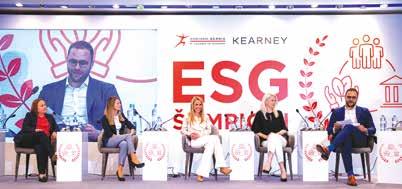
The conference saw company IKEA announced and awarded as 2023 ESG Champion.

The award ceremony was followed by three swift panel discussions that brought together business representatives to highlight the importance of developing a green portfolio for enhancing global competitiveness, generational and cultural differences as an opportunity for maximizing business performance, and the best responsible corporate governance practices.
The event highlighted the best ESG practices in the local market and promoted discussion about the common mistakes companies make in implementing ESG strategies and ways to avoid them.

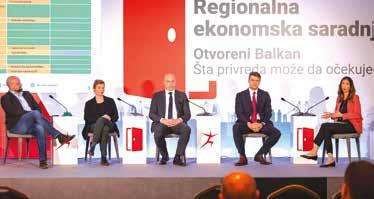
A conference entitled ‘Regional Economic Cooperation – Open Balkan Initiative: What can businesses expect?’ focused on regional economic cooperation platforms and the needs of companies for continued integration. A ministerial panel comprised Serbian Minister for European Integration Tanja Miščević and Serbian Minister of Internal and Foreign Trade Tomislav Momirović, while representatives of the Ministry of Agriculture, Forestry and Water Management, Ministry of Internal and Foreign Trade, Ministry of Health, Ministry of Finance, National Bank of Serbia, and other relevant institutions shared their views on the panel debates covering the free movement of goods and the free movement of capital. The event also presented research conducted jointly by AmCham in Albania, AmCham North Macedonia, and AmCham Serbia that emphasizes the potential for regional economic integration. It was stressed that some progress has been achieved in terms of the free movement of goods, while improvements are desired in terms of labor market access, the movement of capital, and the liberalization of services.
The importance of attracting foreign investors and improving trade was also highlighted.

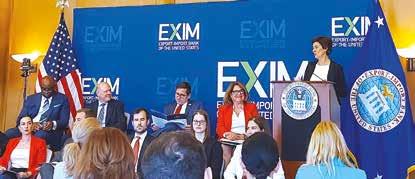
AmCham Serbia Executive Director Vera Nikolić Dimić joined an executive AmChams in Europe (ACE) delegation attending the annual 2023 U.S. Conference in Washington, D.C., and Houston, Texas, to discuss policy with leading representatives of the U.S. administration. The group met with leading U.S. stakeholders, including Jose Fernandez, Under Secretary for Economic Growth, Energy, and the Environment, U.S. Department of State; Marisa Lago, Under Secretary of Commerce for International Trade, International Trade Administration, U.S. Department of Commerce; and Suzanne Clark, U.S. Chamber of Commerce President and CEO. They discussed the importance of the transatlantic relationship, the competitiveness of Europe, energy, and other global challenges. The delegation also met with representatives of Export-Import Bank, POLITICO, member companies, and business leaders from Collins Aerospace, ExxonMobil, and Honeywell. They also paid visit to the NASA Space Center.
Nikolić Dimić had an additional meeting with Serbian Ambassador to the U.S., H.E. Marko Đurić.

An AmCham Serbia delegation embarked on an economic mission to the U.S. with the aim of strengthening institutional and economic prerequisites for increasing bilateral trade and opportunities for new investments between Serbia and the U.S. The delegation sought to showcase the positive experiences of American companies already operating in the Serbian market.
AmCham Serbia President Stefan Lazarević led the delegation, which comprised board members Ronald Seeliger, Second VP, Igor Lončarević, Secretary Treasurer, and Goran Vasić, Untitled Governor, as well as Deputy Executive Director Amalija Pavić. They met with David De Falco, Deputy Assistant Secretary for Europe and Eurasia at the U.S. Department of Commerce, Gabriel Escobar, Deputy Assistant Secretary of State, representatives of USAID and the U.S. International Development Finance Corporation, as well as members of the U.S. Congress and Senate. Discussions focused on the avoidance of double taxation, the renewal of the general system of preferences, the DFC’s active engagement in the region, and investments by American companies in various sectors.
Henry Kissinger, who turns 100 on May 27, is widely regarded as one of the most influential figures in 20 th-century international relations. The German-born American diplomat, scholar and strategist has left an indelible legacy in global politics that continues to act as a bookmark for international relations scholars, students, and today’s practitioners of statecraft.

From the late 1960s, Kissinger played a momentous role in shaping U.S. foreign policy and navigating the complex dynamics of the cold war era. His contributions to international relations have had a lasting impact, earning him recognition as a visionary strategist and diplomat.
Few would disagree that Kissinger’s influence on U.S. foreign policy has been immense, importantly as a thinker and academic. But his most significant impact was through his work as secretary of state and national security adviser to U.S. presidents Richard Nixon and Gerald Ford.
One of his key contributions was his work towards U.S. rapprochement with the People’s Republic of China, planning Nixon’s historic trip to China in 1972 through covert negotiations and deft diplomacy. It was a milestone event in U.S. foreign policy that has shaped Washington’s engagement with Beijing since.

Kissinger’s participation in negotiations for the Paris peace accords from 1968 to 1973, which effectively ended direct U.S. involvement in the Vietnam War, was another key achievement. His relentless efforts in shuttle diplomacy between the U.S., North Vietnam and South Vietnam, contributed to establishing a ceasefire and evacuating U.S. soldiers, ending direct US involvement.
But despite the accolades, triumphs – and even the Nobel peace prize in 1973 for his contribution to the Paris accords – Kissinger’s record and legacy are controversial. There has long been a debate concerning Kissinger’s approach to international affairs, which according to his many detractors often overlooked ethical considerations.
Concerns about links to violations of human rights and the undermining of democratic values were sparked by his backing for authoritarian regimes such as Chile under Augusto Pinochet. Regardless, Kissinger never wavered in his conviction that his diplomacy should put U.S. interests first while appreciating the complexity of the international scene.

From his days in government, and then through his continuing influence as a renowned scholar, Kissinger’s strategic thinking and diplomatic approach have shaped U.S. foreign policy in significant ways.
The biggest contribution Kissinger made to US foreign policy was his advocacy for “realpolitik”. He believed that the U.S. should base its foreign policy decisions on a clear and systematic assessment of power dynamics and the pursuit of geopolitical stability.
A leader does not deserve the name unless he is willing occasionally to stand alone. It's never happened in history that every region in the world could affect every other region simultaneously. The Roman empire and the Chinese empire didn't know much about each other and had no means of interacting. Now we have every continent able to reach every other.
- Henry KissingerIt was an approach that emphasised the pragmatic pursuit of national interests instead of a strict adherence to abstract ideological principles.
The key feature of this realpolitik was the importance of maintaining a balance of power, believing the U.S. should actively engage with other major powers to prevent any one nation from gaining hegenomy or threatening U.S. dominance.
This approach shaped his handling of major geopolitical events during the cold war, such as the aforementioned normalisation of relations with China, as well as the development of a détente policy towards the USSR in the early 1970s. This per-
spective also emerged clearly in his approach towards the Russian invasion of Ukraine.
Kissinger also made significant contributions to arms control and nuclear non-proliferation efforts during his tenure at the state department. His thinking on nuclear deterrence em -
phasised strategic stability and the need to prevent proliferation.

In this sense, his emphasis on negotiations and diplomatic engagement – intensified by his shuttle diplomacy method – managed to reduce the nuclear threat.
He played a pivotal role in negotiating the strategic arms limitation talks (Salt) in the 1970s, which resulted in the landmark agreements Salt I (1972) and Salt II (1979), fostering stability in US-USSR relations.
In the Middle East, his shuttle diplomacy once again demonstrated his ability to bring adversaries to the negotiating table, notably during the Arab-Israeli conflicts of the 1970s and the negotiation of the Sinai II agreement in 1975, which –temporarily at least – stabilised relations between Israel and Egypt.
But Kissinger’s legacy has also attracted foreceful criticism. Among his most vocal and persistent critics was the late British writer and journalist Christopher Hitchens. Hitchens’ book “The Trial of Henry Kissinger” presented a series of arguments about alleged war crimes committed by his American “nemesis”.
Kissinger wrote several influential books, including Diplomacy (1994), On China (2011), and World Order (2014)
BooksHitchens accused Kissinger of disregarding international law and violating the sovereignty of many nations. His alleged involvement in controversial military actions such as the secret bombing campaigns of Cambodia and Laos has drawn substantial criticism and raised concerns about accountability and transparency in US foreign policy decision-making.
Moreover, America – under his guidance – also stands accused of launching in covert operations to overthrow the legitimately elected president of Chile, Salvador Allende, in 1973 in order to install Pinochet), and of turning a blind eye to human rights abuses that occurred during Pinochet’s regime.
Similarly the country’s ostensible support for the Suharto dictatorship in Indonesia disregarded human rights and basic ethics. Of this, Kissinger had this to say in a interview with The Spectator in 2022:
Kissinger’s participation in negotiations for the Paris peace accords from 1968 to 1973, which effectively ended the direct US involvement in the Vietnam War, was another key achievementWhite House meeting about New START Treaty
Kissinger won the Nobel peace prize in 1973 for his contribution to the Paris accords
I am, by instinct, a supporter of a belief that America – with all its failings – has been a force for good in the world and is indispensable for the stability of the world. It is in that region that I have made my conscious effort.
Despite all the criticism, Kissinger endured and remains a respected international relations scholars and advisor to this day. After leaving government in 1977, he reentered academia, serving as a professor at Harvard University, where he had previously earned his doctorate in government. As a scholar, Kissinger wrote several influential books, including Diplomacy (1994), On China (2011), and World Order (2014).

That he was invited to address the World Economic Forum at Davos this year shows that, although divisive, even today Henry Kissinger remains a highly influential figure.


 ByAndréCarvalho,PhDResearcher,Department ofWarStudies,King'sCollegeLondon
ByAndréCarvalho,PhDResearcher,Department ofWarStudies,King'sCollegeLondon
Kissinger never wavered in his conviction that his diplomacy should put U.S. interests first while appreciating the complexity of the international sceneBiden and Kissinger President Ford informally concludes the Vladivostok Summit Meeting at Camp_David to discuss the Vietnam situation President Trump Meets with Henry Kissinger

She debuted at the Apollo Theater in 1935 and began recording under her own name in 1936
COLLABORATION
Holiday’s most notable collaborations were with legendary saxophonist Lester Young, who gave Holiday her moniker “Lady Day”
Similar to the founding principles of the blues, Billie Holiday’s life was marred with both the harsh realities of personal woes and boisterous changes of tempo. Nicknamed “Lady Day,” the Philadelphia-born singer used her tumultuous life experiences to create timeless jazz records. Considered by many to be one of the greatest jazz vocalists of all time, and within her music, her style became so unique that she altered the genre norm with songs like “I’ll Be Seeing You,” “Strange Fruit,” and “All of Me.” She also set jazz standards with songs like “What a Little Moonlight Can Do” and “Easy Living.”
Holiday left employment as a maid to pursue work as a dancer in Harlem nightclubs. At one of those clubs, she was asked to sing. She quickly began singing in many of the Harlem nightclubs and soon established a following of admirers, despite having had no formal musical training.
Holiday’s career began to grow, thanks in part to the interest of John Hammond of Colum-
Perhaps Holiday’s most notable collaborations were with legendary saxophonist Lester Young, who gave Holiday her moniker “Lady Day.” Together, they created some of the most important jazz music of all time. Of her groundbreaking vocal style and delivery, Holiday once said, “I hate straight singing. I have to change a tune to my own way of doing it. That’s all I know.”
As both a vocalist and a songwriter, Holiday penned God Bless the Child and Lady Sings the Blues, among others. Her interpretation of the anti-lynching poem Strange Fruit was included in the list of Songs of the Century by the Recording Industry of America and the National Endowment for the Arts.
bia Records, who organized her first recording with Benny Goodman in 1933. She debuted at the Apollo Theater in 1935 and began recording under her own name in 1936.
Holiday toured extensively in 1937 and 1938 with the Count Basie and Artie Shaw bands. While on tour, Holiday was often subjected to discrimination.
Holiday’s autobiography, Lady Sings the Blues, was written in 1956. She won five Grammy Awards and was inducted into the Rock and Roll Hall of Fame in 2000 and the Nesuhi Ertugan Jazz Hall of Fame in 2004.
Holiday, known for her deeply moving and personal vocals, remains a popular musical legend more than fifty years after her death. Despite personal obstacles, Holiday inspired many with her vocal gifts and continues to be recognized as a seminal influence on music.

Holiday won five Grammy Awards and was inducted into the Rock and Roll Hall of Fame in 2000 and the Nesuhi Ertugan Jazz Hall of Fame in 2004
Yellowstone's stunning natural beauty inspired the 19th-century push to set aside the land, where Indigenous people had been present for millennia

There are 63 national parks in the United States, but none has captivated the American imagination quite like Yellowstone National Park, the very first of its kind. The park encompasses more than 2 million acres across Wyoming, Montana and Idaho, and showcases unique natural features and stunning wildlife. But without the efforts of a dedicated few, it might never have existed at all.
While the majesty and wonder of public parks is obvious to visitors today, in 1872 the idea of setting aside such a vast territory was hard to grasp. In the post-Civil War era, land was being parceled and sold to investors and developers in pursuit of immediate economic benefits. The notion of preserving land for the recreational enjoyment of future generations was not widely embraced nor understood.
But the ideas on which Yellowstone was founded—public access, enjoyment of nature, and conservation of wilderness—took root in the American imagination, and inspired the creation of subsequent national parks across the United States and around the world.
Though national parks are often imagined as untouched wilderness, Yellowstone was shaped by the continuous presence of Indigenous people on the lands and waters for thousands of years. Long before the first settlers encountered Yellowstone, at least 27 federally-recognized Native tribes had connections to the region that dated back to time immemorial.

The array of tribal names for the area reflected its importance and meaning: the Crow called it Aw’Pawishe, meaning “land of steam,” while the Assiniboine and Sioux called it Pahaska, or “white mountain country.” The Tukudika, a Shoshone band, lived year-round in what would become Yellowstone National Park, while other tribes traveled through the area for trade, subsistence and ceremonies.
Yellowstone was especially valuable as a source of obsidian, a volcanic glass used to make knives, arrowheads and other tools, and more than 50 ancient obsidian quarry sites have been documented in the park by archeologist Douglas MacDonald.
After Yellowstone National Park was established in 1872, park officials began to forcibly deter Native Americans from entering and using the park, and the Tukudika were relocated from their home in Yellowstone to nearby reservations. “Yellowstone National Park is surrounded by Indian reservations,” says Mark Fiege, professor of History at Montana State University. “And their creation was directly related to the creation of the Yellowstone National Park boundary.”
Concerned that their presence would deter tourism, administrators perpetuated the false idea that the tribes were afraid of the geothermal features and voluntarily avoided the area. Meanwhile, regulations enacted to protect the wildlife and natural features of the park were also used to prohibit Native Americans from hunting, fishing or gathering obsidian and other materials.
The first reported non-Native visitor to Yellowstone was John Colter, a member of the Lewis & Clark Expedition, who explored some of the region in the winter of 1807 and 1808 in pursuit of trapping and fur trading opportunities.

For the next 60 years, descriptions of geysers and hot springs were relayed by Colter and other mountain men, until organized expeditions began in 1869 with the Folsom-Cook expedition. Many believe that the idea of a national park first arose during the subsequent Washburn-Doane Expedition of 1870, during a conversation around the campfire by members of the party who were awed by the natural wonders they encountered.
However, there were more pragmatic reasons to consider creating a national park. “No one could think of anything useful to do with it,” says Patricia Limerick, professor of history and director of the Applied History Initiative at the University of Colorado Boulder. The high, mountainous
terrain was ill-suited for agriculture, logging or development. “But what made it useful was railroads, because they needed places to stop, places for people to go. The advent of railroads was very important for public parks, even though trains and wilderness seem kind of opposed.”
Nathaniel Langford, a member of the Washburn party, was approached by Northern Pacific Railroad CEO Jay Cooke, who felt that promoting Yellowstone as a tourism destination could help to secure support for his planned rail extensions through Montana.

As historian Paul Schullery writes in Searching For Yellowstone, Langford gave a number of lectures about Yellowstone upon his return from the area that were financed by Cooke. One of these talks captivated a geological surveyor named Ferdinand V. Hayden. Hayden obtained congressional support for an exploration in 1871, and brought with him a photographer named William Henry Jackson and a painter, Thomas Moran.
Like the Washburn expedition, Hayden’s party returned to the nation’s capital with remarkable stories and samples from Yellowstone. But thanks to Moran and Jackson, they also had photographs, sketches and oil paintings, many of which were
The Crow called it Aw’Pawishe, meaning “land of steam,” while the Assiniboine and Sioux called it Pahaska, or “white mountain country.”
exhibited in Congress as senators contemplated the proposal to establish a park.
Images like Grand Canyon at Yellowstone Park or the towering Old Faithful geyser, captivated the public imagination more than reports or speeches ever could. In the words of Hiram M. Chittenden, Captain of the Corps of Engineers “the regions where such wonders existed should be preserved to the people forever.”

President Ulysses S. Grant signed the Yellowstone National Park Protection Act on March 1, 1872, which declared the park was “hereby
Many believe that the idea of a national park first arose during the subsequent Washburn-Doane Expedition of 1870, during a conversation around the campfire by members of the party who were awed by the natural wonders they encountered
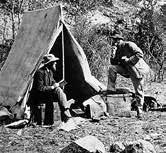
reserved and withdrawn from settlement, occupancy, or sale under the laws of the United States, and dedicated and set apart as a public park or pleasuring ground for the benefit and enjoyment of the people.”
(While it’s often referred to as the first national park in the world, that title arguably belongs to Bogd Khan Uul National Park, which was protected by the Mongolian government in 1783.)
The language of the act reflected the higher aspirations of public lands for crafting America’s national identity. Frederick Law Olmstead, a landscape architect who co-designed New York City's Central Park and drafted a charter for Yosemite in 1865, wrote passionately about the obligation of the government to protect such places. “It is the main duty of government, if it is not the sole duty of government, to provide means of protection all citizens in the pursuit of happiness,” wrote Olmsted, arguing that happiness could be found through the “occasional contemplation of natural scenes of an impressive character.” Public parks, wrote Olmsted, ensured such happiness was available to all citizens, upholding the values of unity, liberty and equality.
Despite these democratic ambitions, the creation of Yellowstone and other national parks was not without tension, particularly among the locals. “Before the park was created, people hunted for food,” says Limerick. “After the park was created, that became an illegal act called poaching. And that changed the whole tenor of life in neighboring communities.”
In the words of historian Paul Schullery, “The idea of Yellowstone is, like nature itself, a work in progress.” As public understandings of Native rights and history evolve, the legacy of Yellowstone becomes more complicated in retrospect. Challenging, dynamic character is what makes the park so special.
“It never stands still, it always changes. And it will always be a place that challenges the mind,” says Limerick, “The geysers and hot springs, all the many different forms of life—it’s chronically, wonderfully unsettling. Is that always comfortable? No! But we can’t make it into an interchangeable part of the American experience.”
By MichelleE Cyca
In the words of historian Paul Schullery, “The idea of Yellowstone is, like nature itself, a work in progress.”The Idea
